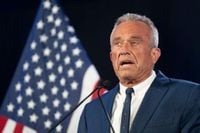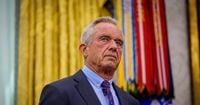In a controversial move, Health and Human Services Secretary Robert F. Kennedy Jr. is spearheading an initiative to create a registry of individuals with autism in the United States. This plan, which has sparked significant debate over privacy and ethical implications, involves the National Institutes of Health (NIH) collecting private medical records from various government and commercial databases. According to NIH Director Dr. Jay Bhattacharya, the collected data will include prescription records, lab tests, genomic data from the Department of Veterans Affairs and Indian Health Service, private insurance claims, and even information from smartwatches and fitness trackers.
During a meeting on April 21, 2025, Bhattacharya announced that the NIH is also working on securing Medicare and Medicaid data, which will further expand the scope of this initiative. He indicated that select outside researchers will be permitted to access and study this data but will not have the ability to download it. This effort is part of Kennedy’s broader goal to make the study of autism a primary focus for the Department of Health and Human Services (HHS).
Despite the stated intentions behind the registry, many critics have expressed alarm at the potential for misuse of sensitive health information. The initiative comes at a time when HHS has laid off thousands of employees, raising concerns that the remaining staff may be more compliant in pursuing Kennedy’s agenda.
Kennedy, known for his long-standing opposition to vaccinations, has faced backlash for his statements regarding autism. He controversially labeled autism as "preventable" and claimed he could find a cure for the condition by September 2025. This assertion has drawn sharp criticism from medical experts, who argue that such claims are not grounded in scientific reality. In fact, the Centers for Disease Control and Prevention (CDC) has launched its own study to explore links between autism and vaccines, a connection that has been thoroughly debunked by the scientific community.
In a speech delivered shortly before the NIH meeting, Kennedy made alarming assertions about autism, stating, "Autism destroys families, and more importantly, it destroys our greatest resource, which is our children… These are kids who will never pay taxes. They’ll never hold a job. They’ll never play baseball. They’ll never write a poem. They’ll never go out on a date. Many of them will never use a toilet unassisted." Such comments have been labeled as stigmatizing and harmful by advocates for autistic individuals, who argue that they perpetuate negative stereotypes about autism.
Advocates have pointed out that Kennedy’s characterization of autism as a "preventable disease" is not only misleading but also dangerous. The Autistic Self Advocacy Network issued a statement condemning Kennedy’s rhetoric, asserting that "autistic and other disabled people belong in our society" and warning against the ideology that promotes the elimination of individuals deemed "unfit". This rhetoric has unsettling historical parallels, reminiscent of eugenics movements that targeted individuals with disabilities.
As the NIH moves forward with its plans, there are concerns that the registry may serve to further marginalize those with autism rather than provide meaningful insights into the condition. The NIH has previously maintained registries for various medical conditions, but the focus on autism is particularly contentious given the current climate of misinformation surrounding the disorder.
Moreover, the NIH’s collaboration with Kennedy has raised eyebrows, especially considering his controversial history with public health. Critics have noted that his extreme anti-vaccine advocacy has previously contributed to public health crises, such as the 2019 measles outbreak in Samoa that resulted in the deaths of 83 people, primarily children. In July 2024, Kennedy suggested that individuals with ADHD and those he claims are "addicted" to common medications should be sent to "wellness farms" for re-parenting, a proposal that echoes troubling historical practices.
Dr. Peter Marks, a top vaccine scientist, commented on Kennedy's ambitious timeline for uncovering the causes of autism, stating, "If you just ask me, as a scientist, is it possible to get the answer that quickly? I don’t see any possible way." This skepticism underscores the broader scientific community's concerns regarding the validity of Kennedy's claims and the motivations behind his initiatives.
The NIH’s announcement of the autism registry has not only sparked discussions about the privacy of medical records but also about the ethical implications of such a project. While the NIH has assured that patient privacy will be preserved through "state-of-the-art protections," the collection of sensitive health data raises questions about who has access to this information and how it may be used in the future.
As the initiative unfolds, the potential consequences for individuals with autism and their families remain to be seen. The intersection of public health policy, personal privacy, and the portrayal of autism in society will undoubtedly continue to be hotly debated topics in the coming months. The implications of Kennedy's efforts could reshape the landscape of autism research and advocacy in ways that are yet to be fully understood.
In the meantime, advocates for autistic individuals are urging a more compassionate and scientifically grounded approach to understanding autism, one that respects the dignity and rights of those affected by the condition. They emphasize the importance of focusing on support and inclusion rather than stigmatization and fear.
As the conversation surrounding autism continues, it is crucial for all stakeholders—researchers, advocates, and policymakers—to engage in constructive dialogue that prioritizes the well-being and rights of individuals on the autism spectrum.



